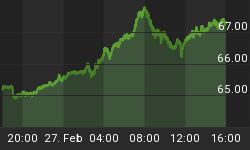In a commentary two weeks ago, I rebutted dangerously silly arguments put forward by New York Times columnist Paul Krugman about how the United States should pressure China to drop its support for the U.S. dollar (click here to view). Although there is far more happening in the world outside of Mr. Krugman's brain than within it, fresh drivel from the acclaimed Nobel Prize winner compels me to turn my focus there once again.
In today's column, Krugman analyzes the Greek debt crisis, arguing that the best solution for Athens would be to simply inflate away its debt burden with printing press money. Krugman laments that this sensible option is being foreclosed by the monetary priggishness of the German heavyweights in the European Union, who are 'foolishly' seeking to prevent inflation and impose fiscal discipline.
His theoretical justification is put forward in a familiar Keynesian recipe: deficit spending leads to inflation and growth, which leads to greater employment and rising GDP, which makes debt payments much easier to bear in relative terms. He laments that Greece does not control its own currency and is therefore unable to pursue such a policy on its own accord. He implores U.S. policy makers, who do control their own monetary policy, to take heed of the danger and avoid such a course.
In simple terms, Krugman believes that inflation is the best cure for burdensome debt problems. To prove his arguments, he points to the course followed by the Unites States in the decade after the Second World War. In 1946, due to unprecedented military spending during the war, U.S. public debt as a percentage of GDP came in at a staggering 122 percent - which is even higher than the 113 percent currently weighing on Greece.
Krugman endorses U.S. policy at the time which, he claims, concentrated on fostering growth instead of taking measures to drastically cut the post-war debt. He notes that by the end of 1956, the federal debt had not diminished in nominal terms, but had become much easier to bear because of the decade of GDP growth that inflationary policies had created.
He neglects to mention that during the five years from 1945 to 1949, federal spending dropped by 58% and taxes fell by 12%. Meanwhile, the budget deficit fell by 66% in 1946 and was in surplus from 1947 to 1949. [i] In other words, although we did not pay down our nominal debt in the decade after the war, we did succeed in massively shrinking government and the burden that it places on society. Could it be that this had something to do with the post-war boom, or should we give all the credit to the monetary policy? (It is important to point out that our national debt did initially decline from 1945 to 1949, but the extra spending necessary to finance the Korean War reversed that trend.)
Also, after the war ended, American factories quickly retooled production from military hardware to consumer goods. The products not only created a domestic boom in living standards, but were also in high demand in war-ravaged Europe. The late 1940's and 1950's produced some of the largest U.S. trade surpluses (in relative terms) in our history.
Today, government spending is rising at the fastest pace on record (not fast enough for Krugman) and our trade deficit is growing as well. In 2011, the government is forecast to spend $3.8 trillion.[ii] To truly replicate post-war fiscal policy, in the next four years: federal spending would have to be slashed by $2.1 trillion to $1.5 trillion, tax revenues would have to be lowered from $2.4 trillion to $2.1 trillion, and the federal budget would have to record a $650 billion surplus. [iii][iv] Since Krugman would never support these spending and tax cuts, he must feel that similar success can be achieved solely through the monetary policy of inflation.
In his column, Krugman warns that the biggest danger of the austerity measures necessary for Greece (and the United States) to pay down debt organically is the deflation that would ensue. Like most of his academic peers, Krugman believes that falling prices are the economic equivalent of kryptonite, guaranteed to bring low even the mightiest economy.
He is wrong. We need deflation. As a result of a phony boom in assets, prices levels are still too high relative to the earning power and productivity of American workers. Falling prices will cushion the blow of recession (by allowing people to buy more with their paychecks and savings) and will eventually encourage people to spend when prices fall low enough. Deflation is the only way to save us from the much greater horror of inflation, or hyper-inflation, which Krugman argues is not actually that bad.
Inflation can't save us from lower real wages and falling living standards, it will simply change the manner in which we are impoverished. With deflation, workers' wages fall; with inflation, consumer prices rise. Deflation hurts, but inflation can spiral out of control, especially with an Administration addicted to spending.
In Paul Krugman's world, deep structural problems can be solved simply by printing currency. I wonder whether he thinks all the Americans in debt should be given little basement printing presses to counterfeit away their troubles.
Krugman's advice will appeal to his fans in government and academia, but won't help the average American. If we dare to follow his lead, a Greek tragedy will be played out in American garb.
[i] FY2008 Budget of the United States Government. "Historical Tables". Accessed: 2010 04 09.
[ii] FY2011 Budget of the United States Government. "Summary Tables". Accessed: 2010 04 09.
[iii] FY2010 Budget of the United States Government. Accessed: 2010 04 09.
[iv] 2010 04 09. United States GDP 2009 (current prices). World Economic Outlook Database.
For in-depth analysis of this and other investment topics, subscribe to The Global Investor, Peter Schiff's free newsletter. Click here for more information.















